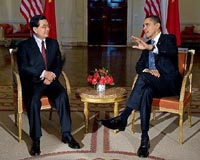 |
Hanoi (AFP) Oct 29, 2010 The United States and Russia will be formally welcomed into a 16-nation Asian bloc on Saturday, in what analysts say is a blow to Chinese attempts to diminish US influence in the region. US Secretary of State Hillary Clinton and Russian Foreign Minister Sergei Lavrov will be invited to join the East Asia Summit (EAS) when the group holds its annual summit in Hanoi on Saturday. Their entry into the EAS, which elevates its diplomatic heft, comes despite Chinese attempts to promote another grouping -- which does not include the US -- as the region's premier forum for regional cooperation. "China will be very uneasy", said John Lee, a China expert at Australia's Centre for Independent Studies think-tank. "This all points to a significant blow to China's broader competitive strategy in Asia, which is designed to gradually ease America out of the region in the longer term," he said. Established in 2005, the EAS is a forum for dialogue on strategic, political and economic issues involving the 10 ASEAN members as well as Australia, China, India, Japan, South Korea and New Zealand. US membership "is part of the American strategic 'coming back' to Southeast Asia... to balance China's growing influence in Southeast Asia," said Li Mingjian from the S. Rajaratnam School of International Studies in Singapore. Observers say China's increasingly assertive stance over issues including maritime territorial disputes may well have pushed its smaller neighbours into Washington's arms. "Chinese diplomacy has been terrible over the past year," Lee said. "Consequently, Asian nations were more than eager to have the US join the EAS whereas there was reluctance in some parts beforehand." Beijing claims all of the South China Sea including the Paracel and Spratly archipelagos, potentially resource-rich rocky outcrops which straddle strategic shipping lanes. Taiwan, Brunei, Malaysia, the Philippines and Vietnam also have whole or partial claims over the region. While China favours a bilateral approach in dealing with individual claimants, other Asian nations and the US are pushing for a united stand which will give them more bargaining power. Clinton angered China in July by wading into the South China Sea issue, saying that resolving disputes over the strategic area is "pivotal" to regional stability, and offering to negotiate a settlement amongst claimants. To the north another territorial row has flared between China and Japan after the September arrest of a Chinese trawler captain near Japanese-administered islands, known as Senkaku in Japan and Diaoyu in China. The US and China are also in the midst of a currency spat. Washington has long accused China of keeping the yuan artificially low, while Beijing says the Federal Reserve's loose monetary policy risks undermining emerging economies. Clinton, in a speech on Asia-Pacific relations Thursday, downplayed suggestions the US is duelling with China for influence in the region. "There are some in both countries who believe that China's interests and ours are fundamentally at odds. They apply a zero-sum calculation to our relationship. So whenever one of us succeeds, the other must fail," she said. "But that is not our view," she said in the speech in Honolulu. "So we are working together to chart a positive, cooperative, and comprehensive relationship." Beijing should embrace the chance to work alongside Washington in the EAS and accept its stabilising role in the region, said Carl Thayer, a Southeast Asia analyst at the Australian Defence Force Academy. "The US presence keeps Japan from militarising and going nuclear and the US military lends stability to the Korean peninsula," he said. Russia's admittance to the EAS club is much less controversial, with analysts saying its importance lies in energy exports and acting as a deterrent to Sino-American rivalry dominating the bloc. Russia and the US will officially join the EAS at the next meeting in Indonesia in 2011, enabling US President Barack Obama and his Russian counterpart Dmitry Medvedev to attend as full members that year.
Share This Article With Planet Earth
Related Links Learn about the Superpowers of the 21st Century at SpaceWar.com Learn about nuclear weapons doctrine and defense at SpaceWar.com
 US vows to get China ties right
US vows to get China ties rightHonolulu, Hawaii (AFP) Oct 28, 2010 The United States vowed Thursday to get its rocky relations with China "right" despite flaring rows, and announced that President Barack Obama would meet President Hu Jintao next month in Seoul. Secretary of State Hillary Clinton, en route to an ambitious tour of Asia, meanwhile raised the regional stakes for the administration, saying its bid to engage rising India and China represented a " ... read more |
|
| The content herein, unless otherwise known to be public domain, are Copyright 1995-2010 - SpaceDaily. AFP and UPI Wire Stories are copyright Agence France-Presse and United Press International. ESA Portal Reports are copyright European Space Agency. All NASA sourced material is public domain. Additional copyrights may apply in whole or part to other bona fide parties. Advertising does not imply endorsement,agreement or approval of any opinions, statements or information provided by SpaceDaily on any Web page published or hosted by SpaceDaily. Privacy Statement |